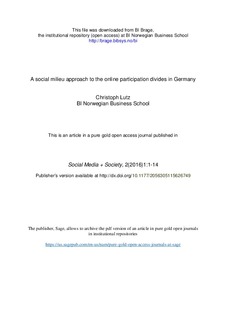| dc.description.abstract | Research on digital divides has been helpful in advancing our understanding of the social structuration of Internet access, motivations to go online, digital skills, and Internet (non-)use, including participatory uses. However, digital divide research has been criticized for oversimplifying the relationship between demographic characteristics and Internet use and for its under-theorization. A social milieu approach, inspired by Pierre Bourdieu’s sociological theory, presents an excellent set of concepts to address these criticisms and thus advance digital divide research. This article uses the social milieu approach for an empirical investigation of the participation divides in Germany. Focus groups and online communities with 96 participants from seven distinct Internet milieus serve to differentiate online participation along social lines. The results show that German citizens are strongly segregated into distinct Internet milieus that differ in their intensity, variety, understanding and attitudes towards online participation. Each milieu displays specific participatory patterns and some of the findings challenge existing research on digital and participation divides. Implications are derived and limitations of the approach carved out. | nb_NO |
